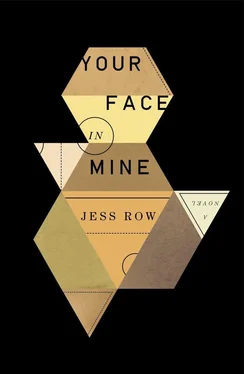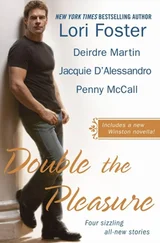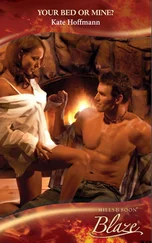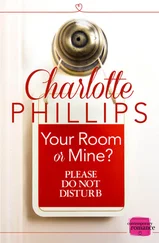It’s just all news to me. He never told me that he’d seen you. Aren’t I allowed to be hurt by that? It’s a betrayal. What else could it be? I wanted to know what happened to you. I was curious. I didn’t abandon you; you abandoned me .
Isn’t that a little strong, Kelly? Abandoned? I don’t recall you wanting to hang out so much senior year. After the band broke up. I don’t recall you leaving me a lot of messages. Did you ever ask him about me, directly? Did you ever mention me in his presence?
How was I supposed to know he had seen you? Anyway, it wasn’t the first thing on my mind. He was dying .
He wasn’t dying . He died.
However you want to put it.
No, he says. It’s different. His death was a discreet event. Not natural. Suicide is never natural.
Didn’t he ever say, you should call Kelly? Didn’t he want to know why you’d disappeared like that?
Haven’t you been listening? He detaches himself from the railing, finally, and begins walking back to Pierson Street, his street, pumping his legs, hardly looking back to see if I’m following. He knew there was something going on with me, he says. He kept talking about my journey . To tell the truth, it bugged me. All this New Age stuff he picked up from NA. The hero leaving home. The three obstacles. Growth. God, he went on and on about growth. Of course he was right. I was able to see that, later. After I stopped being angry. I realized he never really wanted me to be like him.
It took me a long time to see that.
He gives me a look, over his shoulder: you, too? And then, with recognition, or pretending recognition, he nods.
I mean, he says, in a sense you could say it was Alan that gave me permission. He opened that door. He said, there’s more than one way to live. He was into radical solutions, after all. No halfway measures.
No, that’s true. No halfway measures.
—
Rolling toward us on Howard Street, slowly, deliberately, is a Baltimore Police squad car, with two shadowy figures underneath the mirroring glare of the windshield. The driver’s-side window rolled down, a beefy, red-haired forearm adjusting the mirror. And without touching his body, without looking over at him, I feel a change in the envelope of energy around Martin, a crackle of static electricity: and I draw up my breath, stiffen my spine, and open my hands, keeping them in plain sight, keeping my gaze straight ahead, an unworried, unselfconscious man, as I imagine a black man would always have to be, though I’ve never imagined it before in quite this way. It occurs to me that in a way, on this street, in this odd place where pedestrians rarely stray, I am his alibi. There is a percentage by which a white man and a black man walking together by Tilson Falls Park are less likely to be stopped than a black man walking alone. You could do a study. You could measure it. This is the calculus that a black man lives with every day. This is a theory I’ve always understood but never experienced, not once. And, too, it occurs to me, as it should have, long ago, that there’s a reason Martin puts on a suit and a silk tie every day when he leaves the house, whereas I, in my current state, have worn the same hooded sweatshirt, the same jeans, the same black Converse, for three days running. Were I a black man, it occurs to me, working or not, in this city, I would have a dry-cleaning bill. And I want to turn to him, though I won’t, and say, I understand the part about hypotheticals.
I realized something recently, I tell him, instead. Two times nineteen is thirty-eight. We’ve outlived Alan by exactly one lifetime.
Didn’t he always say that he could die at sixteen? Martin says. Having lived a long and happy life? That was his downfall, that Ian Curtis crap. Self-pity. Self-aggrandizing pity. It made him vulnerable. He didn’t value life enough. He just gave it away.
Deep in my chest cavity, in some unmapped region, some imaginary town down a side road from the pancreas to the bile duct, a church bell is tolling, a deep, sonorous vibration, traveling across a lake, up forested hillsides. Something is waking up. A disturbance, an alarm. He knows something. What does he know?
What’s your point?
He stares at me and begins walking even faster, almost at a jog. We’re going somewhere with this story, I can’t help thinking, and he doesn’t want to get there, either. But there’s no other way.
I don’t have a point, he says. Just a good memory.
Recording #4 (1:04:34)
Source:
(1) TDK Chrome cassette tape, 90 minutes, condition —
(2) Sony cassette tape, 60 minutes, condition ++
Labeled both tapes side one “Tape 4 PRIVATE DO NOT DESTROY” “Tape 5 PRIVATE DO NOT DESTROY”
This part has a soundtrack. Bob Marley, “Exodus.” One of the greatest riddim tracks ever. [hums] Bum, bum-bum, bum-bum, bum-bum, bum-bum-bum. Listen to it. Whoever’s listening to this, if anyone ever does: if you don’t have it, go out and get a copy. You should have it on as you listen to me. One layered on top of the other. Don’t worry about the words just yet. Just the bass and the drums.
What do you hear? Walking. Moving. The song is taking you somewhere. Right? Don’t you want to go? Doesn’t everybody want to go? Move. Move. Move.
So what happened from, say, 1994 to 2000, in my life? The lost years. Six lost years. What happens when someone goes out of sight, in this day and age, in this economy, in Baltimore, when they make every effort not to be found? When they have no visible means of supporting themselves? Well, okay. I’ll spell it out.
Pot.
I was running pot in its second heyday, when it was the chronic, the KGB, the Super Sticky, the Buddha, Sour Diesel — when the demand was skyrocketing and the supply, at first, was not that great. Most of what was on the market in 1994 was Mexican junk. Mota. People were adding other stuff to it just to get a buzz — meth, mescaline, even PCP. The Colombians weren’t in the market yet. Escobar didn’t believe in pot. Too much volume. And the American and Canadian growers were just coming in on a large scale. It was just the beginning of hydroponics, aeroponics, when costs were coming down and all those years of hippie research were finally paying off. That was when they invented the Sea of Green and the Screen of Green — autoflowering, cloning, using colloidal silver to feminize the plants. You could put in $50,000 and get yourself a house, racks, trellises, grow lights, carbon scrubbers, ozone generators, seeds, buckets, motion detectors. The whole package. The challenge was all in distribution. You had dealers everywhere, of course, demand was out the window, but most smokers were still used to paying twenty or thirty bucks a bag for total garbage; the high-end stuff was still a niche product. Friends selling to friends. There was a lot of paranoia about expanding your field. What we were doing was like Starbucks. Create a market, then feed that market. Convince people to spend four bucks on a Frappuccino instead of a dollar on coffee, then make sure that Frappuccino is everywhere they want it. In the mall. In the grocery store. Buy bulk and corner the wholesale market.
Seymour was the one who got me going. He was my lodestar, my mentor, my launch pad. My compass. I probably wouldn’t be alive today except for him. We first got together in ’94. First time I met him — it was at a party somewhere, I think at Willa Rodriguez’s mom’s place off Coldspring — he was just back from Miami. Kept going outside to make calls on his cell phone. It was the first time I’d ever seen anyone — other than a banker, maybe, or someone on TV — with a cell phone. The old squarish kind with the huge battery. So I asked him: who do you have to call so desperately, man, at two in the morning?
Читать дальше












